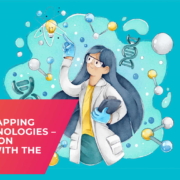Life Sciences Companies Tapping Digital Technologies – Is Localization Keeping Up with the Trend?
There is undoubtedly a trend of life sciences companies venturing into digital technologies, which has been steadily gaining momentum. The life sciences industry has never been an early adopter of technical novelties. However, many companies in the industry have recognized the potential benefits of digital technologies across diverse fields, including research, drug discovery, clinical trials, patient engagement, and healthcare delivery.
Localization plays a pivotal role in the success of the global expansion efforts of these companies. As life sciences companies enter new regions and markets, it becomes imperative for them to effectively localize their digital technologies to comply with local regulations, languages, cultural norms, and user expectations. More and more companies are creating digital platforms, websites, and applications for global audiences, which necessitates multilingual support.
Here are some examples of how life sciences companies have been keeping up with digital localization:
Multilingual SEO: Life sciences companies operate global websites that act as central hubs for information about their products, research, and services. These websites are localized to cater to various regions, and companies also optimize their content for local search engines to ensure maximum visibility in local markets. Our experts work with the internal and external factors influencing the website’s search engine ranking and conduct comprehensive analytical work (installing metrics, running reports, tracking KPIs, etc.)
Multimedia: Video is now more important to consumers than ever before. Wyzowl’s research shows that 91% of businesses use video as a marketing tool, the highest figure reported since they started conducting their surveys. It is widely acknowledged that video has been one of the breakout trends in the marketing world for the past decade. Companies can leverage the power of videos to enhance their brands and keep the audience interested in what they have to offer.
Global Social Media Presence: Businesses engage with different audiences on social media platforms that are prevalent in their respective regions. They produce content that resonates with local users and adapt their social media strategies to align with the cultural norms and preferences of different markets. Janus Linguistic Quality Assessment provides an objective, consistent, metric-driven quality assessment framework to our clients. This assessment examines the translation’s readability: does it flow as if it were originally written in the target language, or does it sound like a literal translation of the source text?
Branding: Consistent branding is crucial in the digital world. Branding material cannot be translated literally. It must elicit the same emotions in the target audience as the source text evokes in the original audience. This means that the translation may deviate from the source text in order to make the transcreated text more appealing to the intended audience. In fields like medicine and pharmacy, for instance, transcreation finds application in slogans and advertisements.
Software and App Localization: Many life sciences companies provide software applications and platforms for data analysis, research, and diagnostics. These platforms must be localized to provide user interfaces in local languages and accommodate any region-specific features or compliance stipulations. Our subject matter experts ensure we use the appropriate terminology and meet the requisite local regulatory requirements.
Market Research: Companies conduct thorough market research to understand the needs, behaviors, and preferences of their target audiences in different regions. This informs their localization efforts and helps them tailor their digital content to specific market segments. Machine translation allows researchers to access and analyze data from various countries and in multiple languages. These data can include customer reviews, social media conversations, market reports, news articles, etc. Our machine translation solutions are highly customizable and make it possible to achieve exceptional productivity in processing larger volumes of content compared to human translation.






